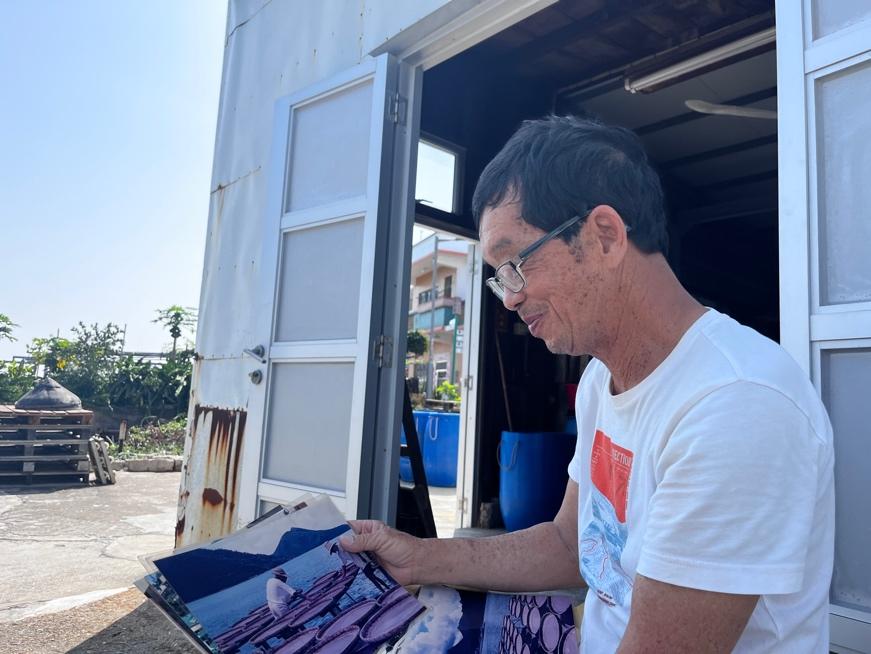Reporters: Charlotte Wu, Lilou Margueron, Kamun Lai, Molisa Meng, Nutcha Hunsanimitkul
Editors: Charlie Chun, Esme Lam, Victoria Fong
Some Hong Kong parents turn to education models focusing on outdoor practical learning.
Reporters: Charlotte Wu, Lilou Margueron, Kamun Lai, Molisa Meng, Nutcha Hunsanimitkul
Editors: Charlie Chun, Esme Lam, Victoria Fong
Some Hong Kong parents turn to education models focusing on outdoor practical learning.
Reporters: Hannah Tang, Lorraine Chiang, Nicole Li, Sunnie Wu
Editor: Karmen Yip, Phoebe Chu, Lesley Lam
Hong Kong ventriloquist try their best to promote ventriloquism and bring happiness to the public.
Former doctor Jason Leong shares his story of being a comedian.
By Ryan Teh
Doctor-turned-comedian Jason Leong is back on stage with a new show after the pandemic.
“It is nice to be working hard and to go through the process of creating a new show, it is something I enjoy,” he says.
Leong says that his current world tour is by far his most ambitious project.
“This year’s tour is the biggest one I have ever done. I will be touring around 25 cities in nine countries. Places like New York City, Melbourne, Indonesia. It is a good time to be a comedian and to be able to travel again” he says.
‘Brain Drain’, the title of Leong’s new show, is referenced to the slang term describing talents leaving their home country.
“The main theme is about how I want to leave Malaysia. This started last year when one of my fellow comedians was arrested and the comedy club was shut down,” he adds.

Malaysian comedian Rizal van Geyzel was arrested and the operation of Crackhouse Comedy Club was suspended in July 2022. Both cases were due to separate allegations of religiously insensitive jokes by Rizal that went viral online.
“I also wanted to talk about how Malaysia has been crumbling and how this among other reasons has made Malaysia unappealing for me. This is how I came up with the name for the show,” Leong continues.
“It is the tour I travel the most extensively outside Malaysia so it is nice to call it the Brain Drain World Tour,” he adds.
One of the stops on his tour is Hong Kong and Leong says he is excited to be back.
“It has been three years since I have been in Hong Kong. I used to come almost every year. The city is one of my all-time favourite places. I love visiting the city centre and also hiking at Dragon’s Back. I especially love the dim sum at Fu Sing Seafood Restaurant (a local restaurant in Hong Kong famous for its dim sum). Thinking about it alone makes me hungry. Now I want some dim sum,” he says.
“And I am very happy to be earning Hong Kong Dollars as well,” he adds jokingly.

With 2023 marking his ninth year in the industry, Leong says he has no regrets about leaving the medical field to pursue comedy since making the switch in 2014.
“I tried balancing being a doctor and a comedian for two years and eventually stopped my practice to focus on comedy. Now my newest Netflix Special Ride with Caution has been getting good reviews, and I am in the middle of touring for my new show so I am enjoying my career to the utmost and definitely have no regrets,” he says.
The comedian also boasts a number of accolades to his name. Ride with Caution’s release in February added to the list by making Leong the first and currently the only Malaysian to have two Netflix Specials.
Leong was also selected to perform at the Just for Laughs Festival in July 2022, the largest international comedy festival in the world.
“These successes are meaningless if they do not spur you to achieve more. They drive me forward to do bigger and better things,” he says.
Behind the Jokes
The former doctor shares that his jokes are inspired by his own life experiences.
“To me, it is really simple. You just see something and then you make fun of it. At first it was mostly from my background, growing up in a Chinese household and growing up in Malaysia. Then as I grew older, I began talking about my experiences as a father, being married to an Indian wife,” he says.
“I have come to realise I really like to make fun of people who like to show off. My favourite joke from my first comedy special was about people showing off their business-class tickets and in my latest one, it was making fun of people who start cycling but honestly, they are just trying to show off their money,” he adds with a laugh.
Even while performing overseas in countries that have local taboos, Leong says that there is no restriction in his creation.
“My intention is to make people laugh, maybe even provoke their thoughts. I want to take their minds off their stress, and of course, be famous as well,” the comedian says.
Leong’s shows also feature a fair share of jokes about Malaysia, particularly the country’s political scene and its figures- a topic that is traditionally considered taboo.
“They give us comedians an endless supply of material to make fun of. It is also becoming quite common in Malaysia on Twitter. So, I am not worried about making jokes about our politics,” he adds.
The comedian does not feel the need to adjust his creation to cater to his international audiences and make sure they understand his jokes.
“Humour is universal… actually you do not have to be Malaysian to understand most of my jokes. Like my bit about cyclists, they are everywhere around the world and most people would get it so I do not ever change my jokes,” he says.

As for his future plans, Leong hopes he can continue with comedy and have his own TV show.
“I (am) hoping to keep doing comedy until I can’t anymore. Maybe let’s try for two more decades. I also plan to travel more and do more shows or stand-up gigs overseas like in New York City. Another thing I really want to do is to produce my own sitcom and be on-screen besides just only being on stage,” he says.
Edited by Esme Lam
Sub-edited by Charlie Chun
By Jasmine Lam
Cheng Kai-keung has to mix 100 pounds of shrimp paste and 13 pounds of salt by stirring the mixture for over 10 hours every day during the production season from May to October. The 67-year-old shrimp paste master has been doing this for over 40 years.
Cheng is the fourth generation successor of Cheng Cheung Hing Shrimp Paste. Established in 1920, it is the only shrimp paste factory in Tai O with a history of over 100 years.
During the production season, Cheng gets up at 6 a.m. and works until 8 p.m. every day.
“If the weather is good, the paste can be dried in one day. After sunlight evaporates the water and breaks down the proteins in shrimps, the aroma of the paste grows stronger. Then it is ready for sale,” Cheng shares.
Cheng used to buy shrimps from fishermen in Tai O but now buys from Mainland China.
“The government banned trawling of silver prawns in Lantau Island waters in 2013, so I buy shrimps from Taishan and Yanggang now,” he explains.
Cheng is responsible for stirring the paste, packing, loading, and delivering the products.
“Shrimp paste is a traditional Chinese food with a long history. It plays an important role in Southeast Asian cuisines such as Viet, Malaysian, and Thai,” Cheng says.
Cheng says the industry has changed over the years to meet the public’s demands. Cheng continues to alter his recipe to adapt to changes in culture and regulations.
“In the 1980s, doctors recommended reducing sodium in food, so the salt used in my recipe has been reduced to three to four pounds per 100 pounds of shrimp paste,” Cheng says.
“Salt is used for taste and as preservatives. If the amount of salt is reduced, the paste will turn bad quicker,” he says.

Cheng says the family business started in 1920 when one of his uncles married a woman who introduced shrimp paste-making skills to the family.
He recalls helping out his family business when he was six. But he worked as a mechanical apprentice for three years and then as a machine operator for two years, before rejoining the family business in Tai O in May 1979 at 23 years old.
“It was the peak season for shrimp paste production and I was the only child in the family willing to take over the business,” Cheng recalls, adding that he has three siblings.
He made use of his knowledge as a machine operator to upgrade some production tools and improve productivity. Cheng says the cost of shrimp paste has risen significantly due to the change in the industry over the years.
“Half a pound of shrimp paste was sold for HK $1.20 (US $0.15) to HK $1.80 (US $0.23) from 1960 to 1967. Now we are selling half pounds at HK $20 (US $2.56), and a pound costs HK $25 (US $3.21),” he says.

His Future Plan
Cheng has three children. He says his daughters have no desire to take over, but he will not force them to inherit the family business.
He believes shrimp paste production is not a declining industry as shrimp paste is a traditional Chinese staple like soy sauce.
“As long as the quality is good, customers will continue to buy it. There is still a huge demand for it in the market,” he says.
Cheng hopes to build trust with his customers by producing high-quality shrimp paste, just like his father did in the past. “If the shrimp paste’s quality is poor, customers will not come back for more,” he says.
“I will always make shrimp paste, it is what I do for a living,” he adds.
Edited by Yap Ying Ye
Sub-edited by Victoria Fong
Daily lives of Macau residents are upset as tourists return to the city.
By James Cheng
Ivy Cheung has to leave home ten minutes earlier to get on a bus for work, as tourists are back in Macau after the pandemic.
“Many tourists take my bus, because the bus route covers popular tourist destinations in Macau Island and Taipa. I used to spend around 20 minutes going to work, now I have to spend at least 30 minutes waiting for buses,” she says.
“Tourists not only visit popular tourist destinations now, but also places where locals go as they want to discover other sides of the city,” she adds.

Cheung points out that one of her favorite restaurants – U Veng Kei, an ordinary cha chaan teng situated in her neighborhood, is packed with tourists at busy times.
“Once, I went there with my family on a Friday night and saw a group of people waiting outside the restaurant. It is very annoying as I used to be able to walk straight in. Though one waiter told me that I just had to wait for a while, I went for other options since we were all starving at that time,” Cheung says.
“U Veng Kei is very popular among tourists since it offers a wide range of Portuguese cuisines such as minced meat with rice in a cha chaan teng manner. Price ranges from around MOP $50 (USD $6.2) to MOP $100 (USD $12.4), which is a very good deal,” she adds.
Another Macau resident Eva Cheang also finds tourists upsetting her daily routine.
“I only have one hour for lunch. Now I have to wait for at least 25 minutes before I can be seated. Sometimes I have to order takeaway instead of dining in.”
“My workplace is in the southeast area of Macau Island. It is a busy commercial and residential district where there are many different kinds of restaurants offering Japanese, Taiwanese, Korean and Thai and Macau cuisine. Also, there are some big casinos such as the Metro-Goldwyn-Mayer hotel (MGM Macau), which are popular among tourists,” she adds.

Cheang observes many young tourists want to visit unique places in Macau for taking photos even on busy traffic roads, which some are recommended by Xiao Hong Shu, a Chinese lifestyle platform many follow to find information about tourist attractions.
“I once saw a tourist walking on the road, San Ma Lo, the main avenue in the heart of Macau Peninsula, only to find the best angle to take photos of the Grand Lisboa Hotel. It is quite dangerous as it is a traffic road. They do not seem to be aware that cars are coming and going,” she adds.
Macau lawmaker Song Pek-kei says about one million tourists visited the city during the golden week from 29th April to 3rd May this year, according to the Public Security Police Force of Macau.
“The biggest difficulty of developing the tourism industry is to strike a balance between the economy and the well-being of the local community.”
Song thinks the government should have better planning to foster tourism while allowing citizens to live their normal life.
“The government should divert tourists to different parts of Macau to avoid overcrowding. Software and hardware facilities, capacity of the local community should be considered when trying to strike a balance between the needs of tourists and local residents so that the industry can be developed in a sustainable manner,” she says.
Edited by Fiona Dongye
Sub-edited by Charlie Chun
Some Hong Kong pet owners choose Traditional Chinese Veterinary Medicine (TCVM) as an alternative practice to treat their pets.
By Liam Hordijk
Karen Wong Hoi-lun has taken her 13-year-old Labrador Wang Wang for Chinese herbs to treat its endocrine disorder – a hormone imbalance – for about two years since the problem began.
“His issues were serious, as Wang Wang could not digest food well and his stool was unusual,” she recalls.
Her pet has also had arthritis for around seven years, which has seen improvement since starting acupuncture treatments also two years ago.
“After the Chinese medicine treatments, Wang Wang’s stomach and intestines recovered, and he has become more energetic and seems more willing to walk. I really believe Chinese medicine methods [for pets] can help. I hope they will become more popular in the future,” she says.
The clinic she goes to offers both Western and Traditional Chinese medicine treatments for animals. Wong says that she has sought both for her dog in the past, but she believes long-term issues are better addressed with Chinese medicine.

“Western medicine would only prescribe diarrhoea medicine and probiotics, which I do not believe can help the dog in the long run,” she says.
“I really believe Chinese medicine methods can help. I hope they will become more popular in the future,”
But some pet owners like Eric Lam Yu-wing, owner of 7-month-old cat Molly, are not fully sold on Chinese medicine treatment for pets.
“My cat has been less playful and having some appetite issues lately. She has not been eating much. I’m open to her getting Chinese medicine, but first I’d like to see if there’s any research on the efficacy of these treatments,” he says.
Lam’s cat was diagnosed with Feline Infectious Peritonitis last March, a disease with symptoms that include fever and weight loss, for which he was told no Chinese medicine solution exists. Instead, Molly would receive antiviral injections.
Studies have been conducted to assess Chinese veterinary medicine treatments and suggest effectiveness in treating issues like storm phobia and even oral cancer when used at the same time as conventional treatments.
But the evidence regarding the efficacy of acupuncture was deemed not “compelling” in the past, according to a 2006 study published by the Journal of Internal Veterinary Medicine. Outside of the evidence being limited to warranting “further investigation”, the “methodological quality” of “[past] trials” was also criticised as “low”.
The Chinese medicine experience
Having employed Chinese medicine on pets for over four years, Dr. Ronnie Tong Long-ning says that he has faced scepticism about his work. But he adds that people are often more convinced of Chinese medicine for pets after several treatments and seeing their pet’s health improve.
Tong says that the most common service he provides to pets is acupuncture, and that acupoints for humans and animals are “quite similar”.

But he adds that a big difference in treating a pet instead of a human is communication.
“The pet cannot speak, so if they have some really minor problem[s] they cannot tell the vet,” he says.
The diagnosis process includes measuring the animal’s pulse, looking at its tongue, and going over its medical history and available test results. Then the treatment is agreed upon between a pet owner and the vet.
Tong says that he feels proud of his work for how it can help animals when other means cannot.
These include a cat that had undergone urethral unblocking surgery three times by the time it was two years old for its recurring urethral blockage.
“Then I tried [treating the cat with] some herbal medicine and acupuncture, and I think for almost two years it has not had the blockage again,” he says.
He adds that one appeal of Chinese medicine for pets is the relatively low costs.
“The cost [of a spinal surgery] is maybe more than HK $100,000 (US $12,700). For the acupuncture it’s around HK $500 (US $63.7) to HK $1000 (US $127) for each treatment,” he says, but adds that the cost of a herbal medicine regimen depends on the case.
Low-risk and ubiquitous
Spokesperson and vet for the Society for the Prevention of Cruelty to Animals (SPCA) Dr. Anita Young Hau-yee says that Chinese veterinary medicine treatments are safe as knowledge of acupoint locations and herbal medicine dosage has been “gradually refined” over time.
She adds that the treatments are tailor-made for each animal.
“The needle lengths and thickness we choose depend on the size of the animal. They are designed to be safe even if the animal moves [during treatment]. The concentration [of Chinese medicine herbs] we use is based on the weights of patients,” she says.

Young adds that acupuncture does not prescribe additional medication that will conflict with the pet’s existing conditions, a major concern especially when treating older animals.
She points out that the average age of Hong Kong’s pet population has increased, partially explaining the increase in popularity of Chinese medicine for pets.
“In Hong Kong there are pets now living well above 10 years of age, so when they start to have chronic illnesses or mobility problems, owners will start to explore new methods,” she says.
Chinese veterinary medicine can also diagnose and treat mild signs of illness that Western medicine cannot, such as restlessness.
Young also adds that there is supply to match the demand, and many certified vets here offer acupuncture service and hold the necessary qualification – a certificate accredited by the United States-based International Veterinary Acupuncture Society (IVAS) – to practise it.
Chinese medicine can complement Western medicine, according to Young.
She highlights a case where one of her patients – a cat already taking all the Western medication for seizures – following acupuncture and herbal medicine treatments, has had its frequency of seizures reduced from a few times a week to once every few months.
“We do acupuncture and Chinese herbs for cases where we’re just supplementing or tonifying,” she says.
But she adds that Chinese medicine has its limits as it cannot address emergency cases or ones that need surgical correction.
Edited by Yap Ying Ye
Sub-edited by Phoebe Chu
Mainland students cross the boundary for cheaper food that cater to their tastes.
By Molisa Meng
Alice Wang* can finally order a cake she likes from Shenzhen to celebrate her birthday in Hong Kong this year as travelers can cross border freely without COVID-19 restrictions.
“I ordered a four-inch cake through WeChat and picked it up from Shenzhen to Hong Kong for my birthday this year. I wanted to get a customized cake but bakeries in Hong Kong mostly sell ready-made cakes,” the Chinese University of Hong Kong (CUHK) student says.
Wang felt overjoyed that travelling between mainland China and Hong Kong finally resumed normally without quotas and COVID-19 tests on either side since her 18-year-old birthday.
Although there are many cake shops in Hong Kong, Wang finds them expensive as compared with those in Shenzhen.
“Bakeries in Shenzhen provide many kinds of cakes at cheap prices. When cakes in Mong Kok cost around HKD700 (USD89), cakes of similar looks in Shenzhen cost only 350 RMB (USD50),” the journalism and communication major student says.

“Other kinds of food are also much cheaper in Shenzhen so I go to Shenzhen for food almost every week.”
“It just takes around 30 minutes to pick up food I ordered across border. It is convenient as the travelling time is more or less the same going to Shenzhen or Mong Kok from CUHK. Also, I am not worried about the food quality as the travel time is so short,” she says.
According to the Statistics on Passenger Traffic from the Immigration Department, the number of people going to Shenzhen from Hong Kong via Lo Wu and Lok Ma Chau Spur Line control points rose from 97,542 to 538,781 in February 2023 after all COVID-19 restrictions were removed at border points.
Another university student, Wang Ruxing, also orders take-away food from Shenzhen because food in Hong Kong is not spicy enough for her.
“I order spicy food in Shenzhen once the border traffic between mainland China and Hong Kong resumes to normal,” she adds.
“The flavour of the spicy food in Twelve Flavours is modified to cater Hong Kongers’ taste so they are made less spicy.”
Wang orders spicy Xinjiang fried rice noodles with MeiTuan, a popular food-ordering and delivery mobile phone application in mainland China and take the food back to Hong Kong to eat. The spicy rice noodles she generally order costs around 20 RMB (USD 3), while it costs around 50 HKD (USD 6) in Hong Kong.

Wang thinks being able to order food from mainland China improves her overall living quality in Hong Kong as she can spend less time on more food that suits her taste.
But the Public Information and Education Division from the Food Safety and Hygiene Department in Hong Kong warns of potential food safety concerns.
“It is vital that residents have access to a safe diet. In the process of cooked food transportation, food quality is difficult to be guaranteed. Citizens need to pay attention,” a reply from the department reads.
“Cooked meals if not consumed immediately after cooking should be kept at a proper temperature. Most pathogenic bacteria grow and multiply rapidly at the temperature danger zone between four degrees Celsius and 60 degrees Celsius,” the department adds in a reply.
*name changed at interviewee’s request
Edited by Lily Wang
Sub-edited by Fiona Dongye
Since the launch of ChatGPT, its ability to generate logical answers in seconds has been grabbing headlines and remained to be the centre of public attention. Some are happy to know that their workload can be shared by the chatbot, while others raise legal and ethical concerns.
Our Periscope section focuses on students who find AI cannot do their coursework. As convenient as ChatGPT may sound, students are reminded not to blindly rely on it and use it wisely.
Cross-border connections resumes after the scrapping of COVID quarantine policies. Mainland tourists have been blamed for upsetting daily life of residents in Macau. Some take advantage of the open border and order food delivery in the mainland for cheaper prices and bring it back to Hong Kong, but hygiene issue is in question.
It takes passion to build our goals and make dreams come true. In our People section, an Asian Games participant and a Hong Kong model tells Varsity their story of struggles.
Stories of perseverance are also included in this issue of Varsity. Our reporters interviewed stores with long history in Hong Kong. A Thai museum curator shares his work in preserving the Mon culture and Ark Eden founder spreads the message of environmental conservation.
This issue of Varsity also explores other interesting topics, ranging from home death services to maid café culture.
Have an enjoyable read!
Charlie Chun
Chief Editor
Maid cafes are not just gathering spots for otaku, but also places where people seek comfort and relaxation.
By Lorraine Chiang
Seeking relaxation, Tom Chan Wai-lun visits maid cafés once a week.
“I am not close with waitresses in maid cafés. But talking to them is more relaxing than speaking to my colleagues because we have no clash of interests. My friends are too busy to chat with me,” Chan says.
Sharing common interests, Chan chats about Japanese anime with waitresses, making maid cafés a rendezvous for otaku or people interested in Japanese manga and anime.
Chan started an Instagram page in March 2022 with 1,116 followers, sharing his dining experience at different maid cafes and his interviews with waitresses at maid cafés.
“Many people mistakenly consider maid cafés as part of the sex industry. That is a huge misconception. In fact, there are many rules at maid cafes. Physical touch is forbidden for example,” Chan says.
“A lot of waitresses are still in secondary school and they just want to gain work experience. They are hard-working,” Chan adds.
Citing a diligent maid he knows as an example, he says, “The maid puts a lot of effort into making drinks for customers. Every time I go there, she tailor-makes drinks for me, and they always taste good. I can feel her dedication to providing good services.”
“The maids also ask you what you like and draw them on omelets with ketchup. I usually ask them to draw cats and dogs, and sometimes I ask for self-portraits,” Chan says.

“I hope others will find joy in maid cafés like me. It makes me feel very happy when other customers tell me they go to maid cafés after checking my page,” Chan adds.
Apart from bringing joy to customers, maid cafés also help waitresses find happiness outside of their daily routines.
Working full-time as a clerk, Mana Kong Hei-ling enjoys dressing up and playing a different character once a week at Maid Academy.
She runs a public Instagram account with about 1,200 followers, and many of them are her customers.
“My customers learn about my updates from my social media account. They find that I have become more energetic after I changed my job. I feel touched,” Kong says.
“It is tiring to work two jobs. But I still want to continue to work at a maid café because I can have fun while making money,” she says.
Apart from her caring customers, Kong also finds support from her colleagues. “They praise me for being charming and energetic on stage. My colleagues also teach me to be myself and remind me not to care about how others think of me. I may not be as popular or pretty as others, but I have my fans who love me for who I am,” she says.

Kong also shares positive vibes with her customers.
“Once a male customer wanted to dress up as a girl and asked me to teach him to do makeup. He used to cover his face in cosplay and ACG (animation, comics, and games) events, but now he has become more confident and shows his face more often,” Kong says.
Li Mei-ting, a lecturer of Cultural Studies at the Chinese University of Hong Kong, attributes the rise of maid cafés in Hong Kong to the emotional needs of ACG fans.
“Otakus have always been stigmatized as losers in Hong Kong and they are labeled as ‘geeks‘. In the past, cosplay was not accepted in mainstream culture so maid cafés are safe spaces for otaku to display their love for moe culture. They turn to maid cafés to share their interests,” Li says.
Moe is the youthful and innocent quality of teenage females, which elicits feelings of protectiveness and affection.
Li points out that the sense of homecoming is also an important attraction of maid cafés.
“When a customer enters a maid café, the maids and butlers say ‘Welcome home, master’. This family kinship answers the need for emotional bonding of these people,” she adds.
“The family kinship is more than just being biologically related. Though the customers know that they pay for the kinship, they still appreciate that,” Li says.
Edited by Phoebe Chu
Sub-edited by Karmen Yip
Challenges and setbacks did not hold Yiu Mei-Ki back from pursuing her modeling career.
By Yilie Lo
Hong Kong model Yiu Mei-Ki, who has walked on the runway for brands like Lili Blanc and Mossi in Paris Fashion Week 2023 was forced to change to another secondary school because of her modeling career.
Having been modeling for four years, the 23-year-old landed her international debut at Copenhagen fashion week this year. She also participated in VOGUE Fashion’s Night Out Hong Kong in March 2023.
But her secondary school ruled that her modeling was “indecent” and would have a negative influence on other students in the summer of 2018, after Yiu, who was in her last year of study at a secondary school, joined a local modeling training camp.
Yiu was given two choices: transfer to another school, or quit modeling for a lifetime with a guarantee letter signed by her and her mother.
“The second choice was unreasonable. They were trying to control my whole life. I know what I want for my life very clearly. I want to embrace challenges instead of having a stable life like an office worker until I retire, ” the young model says.
“I never regret the choice I made about school transfer. Every time I completed a fashion show, I feel wonderful,” she adds.
Yiu was then transferred from Hong Kong Taoist Association Tang Hin Memorial Secondary School, an elite school with over 95% university admission rate, to a Band Three school in 2018.
“It was my last secondary school year. Despite my good academic performance, no school was willing to take me in except for a Band Three school,” Yiu says.
She had a difficult time adjusting to the classes conducted in Chinese because she used to study in an English Medium Instruction (EMI) secondary school.
But Yiu’s new school fully supported her pursuit in the modeling world.
“The school told me that I could do fashion modeling after school or during holidays, as long as it did not affect my academic results,” Yiu says.
Dating back to her teenage days, the pressure from school was not the only challenge she had to overcome. Yiu struggled with weight control since she was 15 and the weight-loss journey continues as she stays in the modelling industry.
“I was not born skinny. When other models weigh around 50 kg at 180cm, I doubled them. I weighed 95kg at 172cm. I tried every way to lose weight to meet the industry’s requirements and it was not easy,” Yiu says.
The young model suffers from insomnia, anxiety, and migraine. She has to take 5-Hydroxytryptophan (HTP) pills every day.
“I have been taking the pills for three years to treat my anxiety. Luckily, there have been no side effects,” she says.
Apart from health issues, Yiu struggled to find work. She did not have a single magazine shoot in the first few years of her career.
“It’s all about connections. If a model starts with an agency with no connections with editors, the model can hardly get a shoot for a magazine, no matter how good the model is,” she says.
“Luckily a make-up artist introduced me to her friend who works in the fashion industry. I finally got the chance to do pictures for Tatler Asia, a magazine that focuses on fashion and lifestyle,” Yiu recalls.

Not long after Yiu started modeling full-time, COVID-19 hit the world.
“I went to Singapore for a model placement in January 2020. Two weeks after I arrived, I completed four jobs. Then, COVID-19 started to spread in Singapore and a lockdown was imposed. Everything stopped. There was no job, no casting, nothing,” she recalls.
“I was stuck in Singapore for three months. When I finally flew back to Hong Kong, everything in the world was put on pause for three years. I didn’t have any job,” she adds.
Despite all the uphill battles, Yiu manages to build her career step-by-step.
She has to pass rounds of casting to compete for jobs with over 1,000 top models.
“After passing all of the castings, I have to try out sample clothes for fashion shows. Clients can still change models when doing fittings. Models can be replaced seconds before a show,” she says.
In the fashion season of Autumn/Winter 2023 that took place from February to March 2023, she walked for young fashion brands like GANNI, Rosin Pierce, Lili Blanc, and MUNTHE with ten shows, where all castings, fittings, and rehearsals had to be done in just three days.
“To be honest, I was exhausted. But at the same time I feel so proud of myself,” the model adds.
Yiu is now taking a break after her hectic schedule.
She plans to start her next fashion week in May or June for Istanbul Fashion Week and Milan Men’s Fashion Week.
Yiu set a goal for herself to complete a full circuit of the “Big Four” fashion weeks, starting in New York, followed by London, Milan, and Paris.
“I think I will stay in the fashion industry as long as I can, as I love fashion. I might become a stylist one day after I retire from modeling,” she says.
Edited by Phoebe Chu
Sub-edited by Fiona Dongye